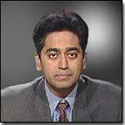The Poetry And Prose of Indian Sport
|
 By Rajdeep Sardesai |
|
|
 By Rajdeep Sardesai |
|
![]() here have been
many occasions when sporting achievement or failure has moved me. India's World
Cup cricket win in 1983, Brazil's loss to Argentina in the 1990 World Cup
football, Kenyan athletes domination in the 1988 Seoul Olympics, Pat Cash's
dream triumph at Wimbledon in 1987, have all stirred me in their own special
way.
here have been
many occasions when sporting achievement or failure has moved me. India's World
Cup cricket win in 1983, Brazil's loss to Argentina in the 1990 World Cup
football, Kenyan athletes domination in the 1988 Seoul Olympics, Pat Cash's
dream triumph at Wimbledon in 1987, have all stirred me in their own special
way.
The 1984 Olympics
There is just one occasion where I have been simply shattered by the emotional roller-coaster ride that sports can take one on. This was the day when India bowed out of the 1984 Olympic Games hockey competition, after drawing with West Germany in their last league match.
The memories of that match are still fresh in my mind. I recall staying up all night to watch the game, which was telecast at around 3 am in India. It was a match that India had to win to make it to the semi-finals.
We had an excellent team, with stalwarts like Mervyn Fernandes, Zafar Iqbal and M. Sommayya in our ranks. Yet, despite having chances galore, we were somehow unable to score.
My eyes welled up with tears when the final whistle was blown. Struggling to sleep, the memory of our captain Zafar Iqbal shooting wide with a near-empty goal before him, continued to haunt me. It took me days to recover.
No loss on the cricket field has moved me in a similar manner. The reason for this, I believe, lies in the fact that hockey, more than any other game, is deeply etched in the Indian psyche.
Romance of Indian hockey
Cricket may attract the larger fan following, performance on the football field may determine the price of fish in Bengal, kushti may bring the entire village's life to a halt, yet it is hockey that brings out the magic and mystery, the poetry and prose in Indian sport.
'Ball Jugglers', 'Magicians of the East', 'Stick Wizards', the adjective flow freely. For unlike other sports, Indian hockey has a glorious history, and much of the romance of the sport is connected with its historical origins. Eight Olympic gold medals is a record not to be scoffed at.
Not surprisingly, India is still seen as the dwelling place of class hockey. We may suffer the ignominy of having to qualify for the Olympic hockey competition, our national hockey tournament may still be conducted on grounds where even cows would hesitate to graze, we may not have won a major title for over a decade now, the rules of the new power game may work against us, and our hockey players may still aspire for only clerical jobs in the Railways. Yet, through it all, we are still regarded as the kings of the game.
Just look at the reaction in the foreign and local press to the performances of our team on their recent European tour. While Pargat Singh and his men have shown good form - their victories over the Great Britain team being particularly notable - the quality of the competition has not always been formidable.
Yet, there has been a readiness to raise our team on a pedestal and suggest that the glory days of Indian hockey have returned. 'Watch out for India in the Olympics!', 'Indian Magicians back at the Top', 'An Indian Summer of Hockey', have been some of the headlines in the British newspapers.
There could be an exaggerated note to some of these writings. We are still nowhere near the very top. Our fitness levels come nowhere near that of the Europeans and the Australians. We can still beat any team on our day, but winning the Olympic hockey gold requires six good days at least.
No, my friends, Indian hockey has still a long way to go before returning to the pinnacle. But then, as I said at the outset, sports is not as much a serious business as it is a sentimental business. Like every time World Cup football is held, we expect Brazil to win, so is the case with Indian hockey.
After all, form is only transient, the romance and history of the sport is eternal.
Article courtesy The Sunday Times of India, 1992